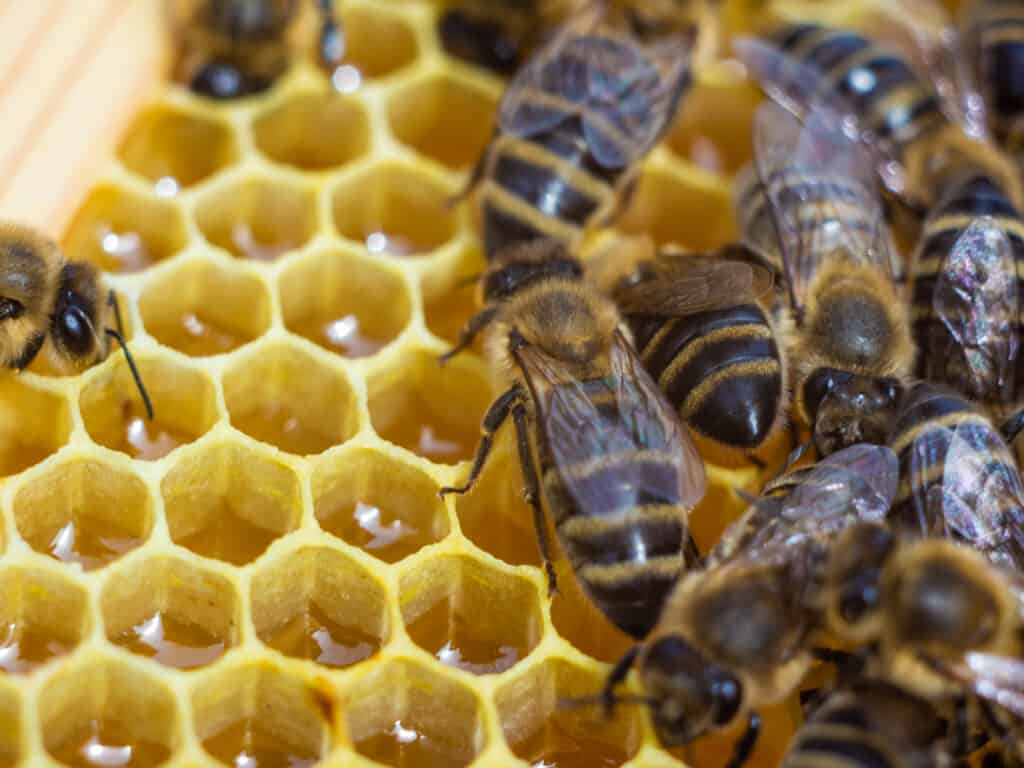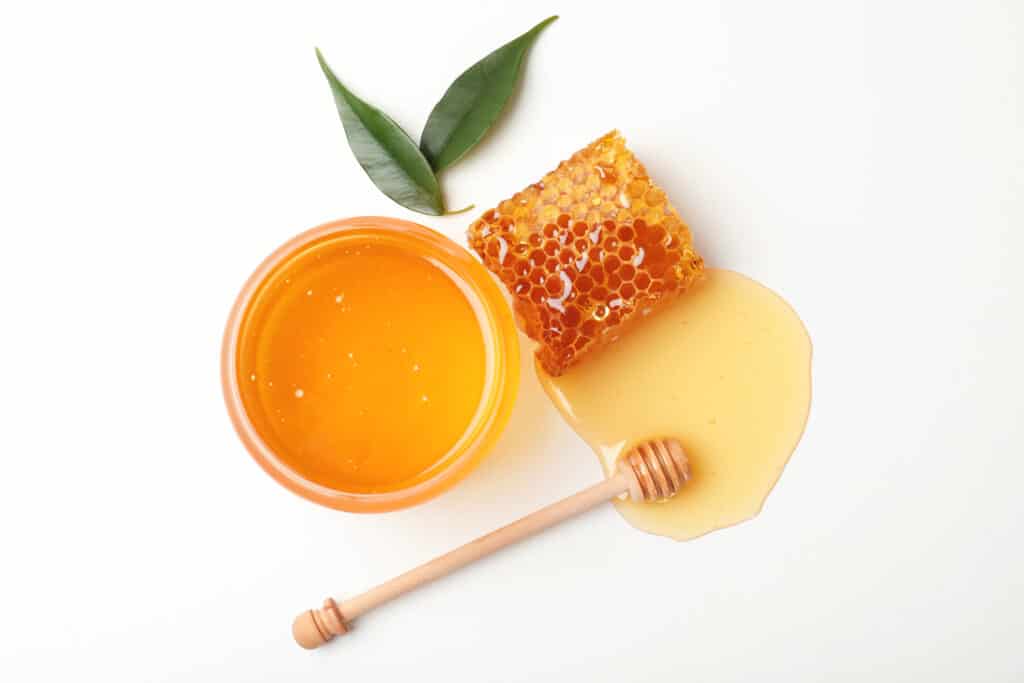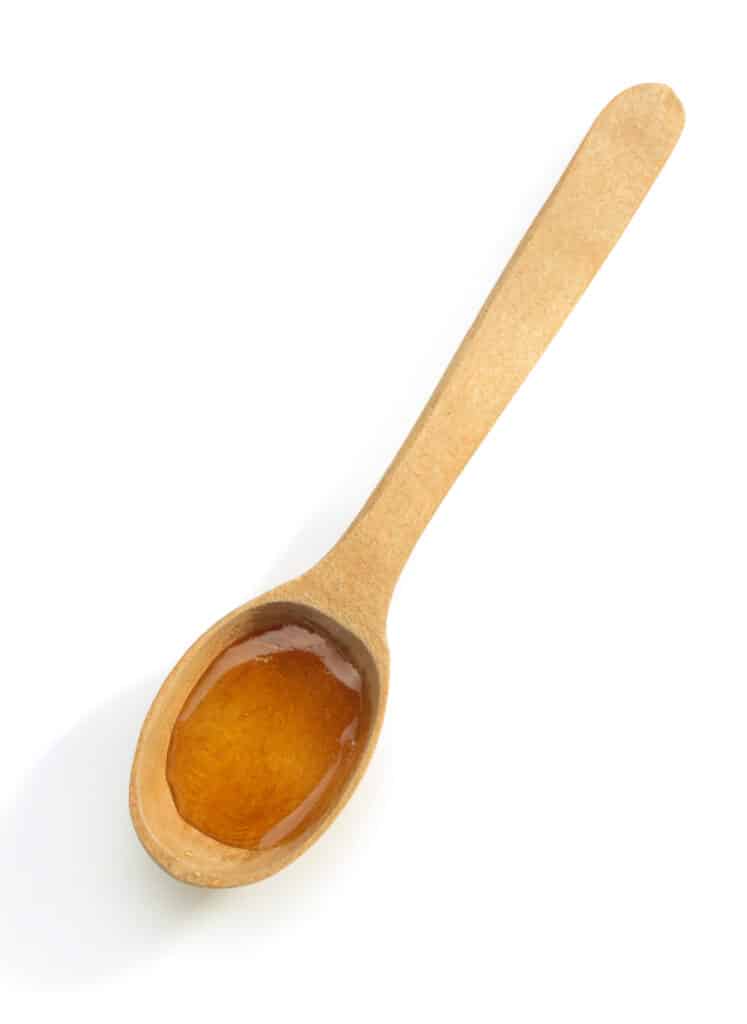Honey provides an abundance of health benefits and has been used around the world all throughout human history. Archeologists have even found honey alongside of mummified remains in Egypt. Honey is still the most commonly used sweetener today, but it can be easy to overlook its fantastic health benefits. If you are wondering if your dog can benefit from having a taste of honey, the answer is yes. But there are a few things you’ll want to keep in mind before you serve some to your dog. Let’s go over some of the wonderful properties of honey for your dog. Read on to learn more.
A Look at How Honey Is Made
As many know, honey comes from the hard work of bees. Thanks to their effort, we have a wonderful sweetener that offers many health benefits. Bees fly from flower to flower collecting the sweet nectar and then making the honey in their hives. The purpose of honey is to feed the bees when there are no flowering plants available. This is why honey needs to be suited for long-term storage and why it can last for many, many years (think of the honey found in Egypt still intact).
Bees fly around looking for sources of nectar, using their tongues to collect the sugary liquid from flowers. They then deposit the nectar into their second stomachs called “crops”. The nectar then mixes with the enzymes in their crops that make it more suitable to last for long-term storage and then the bees carry it off back to their hives. Once they’re back, they transfer the nectar by mouth to other worker bees who will then deposit it into the honeycomb. The worker bees fan the nectar to help evaporate and remove any moisture or water which creates a thick, syrup-like substance that we know as honey. Afterward, they seal the comb cells with a wax substance for storage. The entire process of making honey is quite amazing. Now, let’s take a look at some of the health benefits.

Bees make honey by collecting nectar from plants. The nectar is then deposited into the honeycombs in their hives for long-term storage.
©Goncharov Taras/Shutterstock.com
Health Benefits of Honey for Dogs
First we’ll start by saying that honey is very sugary and high on the glycemic index, as it is a natural sweetener after all. So if your dog is diabetic or has any other health issue that effects his sugar levels, you may not want to give him honey, as this could interfere with his blood sugar levels.
Raw, unpasteurized honey has the most health benefits, as it is honey in its most natural, pure form. Honey that is heated or processed in any way can contain additional ingredients that are unnecessary and potentially harmful. Things like high fructose corn syrup can be added into honey which dilutes its medicinal value and could create health issues if consumed in excess. So if you plan to feed your dog honey, be sure to get the raw unpasteurized kind, or some from a local bee keeper if possible.
Antioxidants: Vitamin C, A, and E, along with flavonoids and phenolic acid work together to give honey its powerful antioxidant properties. They help combat the negative effects of free-radicals that cause cellular oxidation damage within your dog’s body. These antioxidants together also work to help boost your dog’s immune system and increase its health.
Vitamin D and E: These are two fat-soluble vitamins that will support your dog’s bone health. They also regulate the immune system and provide blood clotting properties.
B-complex vitamins: These vitamins are the building blocks of a healthy body. They will help support your dog’s energy levels, as well as his brain function and metabolism.
Fat-soluble minerals: Manganese, magnesium, and copper help aid in the production of red blood cells and collagen. They also promote muscle development, growth of ligaments and tendons, and bone density.
Anti-fungal, antimicrobial, antibacterial properties: The enzymes that are found in honey can help reduce inflammation and soothe stomach ulcers and sore throats. If you were to apply a thin layer of honey to the skin, it would stimulate the healing of wounds, hot spots, eczema, and bug bites. When honey is consumed, it helps rid the gastrointestinal system of bad bacteria that can cause diarrhea.
Anti-inflammatory properties: Honey can be helpful to senior dogs that may suffer with joint pain, as well as dogs that may have gotten small wounds or bug bites.
Seasonal allergy relief: Honey contains small amounts of flower pollen that can help stimulate your dog’s immune system and help it create antibodies that can prevent autoimmune responses to pollen in the air. Pollen contains quercetin which is a polyphenol rich in antihistamines that relieve itchy, watery eyes due to environmental allergies. This is one of the reasons why local honey is better, as its more likely to contain this type of pollen.

Raw honey can have tons of health benefits for dogs but honey that’s been treated is too high in calories for them.
©New Africa/Shutterstock.com
How Much Honey Can My Dog Eat?
As we mentioned before, honey contains a lot of sugar. Even though it is sugar from a natural source, too much of it can still cause issues—especially for dogs that are diabetic, obese, or have other health issues. If your dog falls under one of these categories, you should not feed him honey.
Most dogs can tolerate one teaspoon of honey per day. One teaspoon of honey contains 17 grams of sugar and 70 calories. Here are some guidelines you can follow based on the size of your dog:
- Small dogs under 20 pounds—1/4 teaspoon per day
- Medium dogs 10-20 pounds—1/2 teaspoon per day
- Larger dogs 20-50 pounds— one teaspoon per day
- Large-breed dogs over 50 pounds—2 teaspoons per day
Keep in mind that is possible for your dog to eat too much honey. If it has eaten too much, their blood sugar levels may become elevated and you might notice symptoms such as vomiting, diarrhea, or loss of appetite. If you notice your dog displaying any of these symptoms, get in touch with your vet as soon as possible.
Ways to Offer Honey to Your Dog
The easiest and simplest way to offer honey to your dog Is to offer it by spoon. Just offer your dog its recommended amount right on the spoon and allow them to lick it off. You can also try adding it to fresh, dog-safe fruits or on top of their healthy dog food for added sweetness.
You can also use honey in place of sugar for homemade treats as a healthier alternative. Just keep in mind that heating honey removes many of the health benefits, so if it’s possible, try adding the honey after the treat has been prepared.

The best way to offer honey to your dog is by spoon.
©Seregam/Shutterstock.com
Overall
Yes, dogs can eat honey. It can be a healthy occasional treat for your dog that offers many great health benefits. If your dog suffers from diabetes, obesity, or any other health issue, you may not want to feed it honey. Always check with your vet if you have any questions or concerns before you introduce a new food into your dog’s diet.
Other Dog-Safe Foods
The photo featured at the top of this post is © naturepicture_rika/Shutterstock.com
Ready to discover the top 10 cutest dog breeds in the entire world?
How about the fastest dogs, the largest dogs and those that are -- quite frankly -- just the kindest dogs on the planet? Each day, AZ Animals sends out lists just like this to our thousands of email subscribers. And the best part? It's FREE. Join today by entering your email below.
Thank you for reading! Have some feedback for us? Contact the AZ Animals editorial team.







